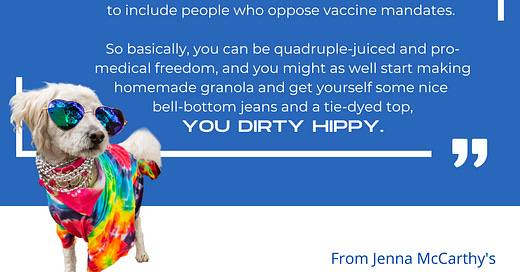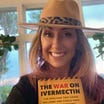Words Matter
Jenna McCarthy recounts how many words and phrases have been bent and twisted to mean different things ever since COVID came to town.
When I was growing up, “I’m sorry,” was the requisite response to “you apologize to your sister right this minute” after you yanked out a handful of her hair or accidentally (on purpose) broke her favorite Barbie. There was no genuine remorse or promise of reform required. “I’m sorry” bought you half-hearted forgiveness, got you out of major trouble, or both.
It was basically BS.
As a mother and a career linguist, “I’m sorry” wasn’t an option if my daughters injured, outraged, or offended each other — whether carelessly or intentionally. The phrase was trite, I explained; meaningless. Instead, because I believe that words matter deeply, I chose to encourage this alternative: “I feel bad about what I did, and I’ll try not to do it again.” (Without the trying part, it would be almost as platitudinous as “I’m sorry.”)
It must suck to have a mom who’s a writer.
Like just about everything else in the world, words have gotten wonky since COVID came to town. Almost out of the gate, we were told to shelter in place, a phrase once employed only in life-or-death, bombs-are-falling, get-under-your-desks emergencies. Suddenly it meant, “You know, you should really probably stay at home unless you’re out of Pantene, your dog swallowed a sock, or someone in your circle needs a margarita to go.”
Some words saw their actual, official definitions altered to fit the emerging narrative. Merriam-Webster quietly decided that an “anti-vaxxer” was no longer simply a person who opposes the use of some or all vaccines, but henceforth would also describe those who oppose regulations mandating them. So basically, you can be quadruple-juiced and pro-medical freedom, and you might as well start making homemade granola and get yourself some nice bell-bottom jeans and a tie-dyed top you dirty hippy.
Similarly, the CDC changed its definition of “vaccine” mid-pandemic from “a product that stimulates a person’s immune system to produce immunity to a specific disease, protecting the person from that disease” to “a preparation that is used to stimulate the body’s immune response against diseases.” Convenient, right? They never said it protected you from anything. It’s right there on the website!
When I asked ChatGPT to tell me what a breakthrough case of COVID was, it described this unicorn-level occurrence as “when a person who has been fully vaccinated against the virus later becomes infected with the virus.” The AI chat platform nearly tripped over itself to add: “It is important to note, however, that breakthrough cases are still relatively rare. Vaccines have been shown to be highly effective in preventing severe illness, hospitalization, and death from COVID-19, even against new variants of the virus.” Never mind the countless analyses that have found that your risk of severe illness, hospitalization, and death increases with each booster. It’s just those pesky breakthrough cases. (Oh, and you’re a domestic terrorist if you say or even think otherwise.)
By literal definition, disinformation is “false information deliberately and often covertly spread in order to influence public opinion or obscure the truth.” And yet the Center for Countering Digital Hate (the irony!) boldly baptized 12 individuals the “Disinformation Dozen” for promoting proven therapeutics, acknowledging natural immunity, pointing out the abysmal failure of the so-called vaccines, and encouraging natural remedies. A proper logophile (or domestic terrorist) might dub them the “Inconvenient to Pharma Dozen.” But semantics.
Curiously, the definition of a mandate is “an authoritative command.” A law, on the other hand, is “any written or positive rule prescribed under the authority of [a] state or nation.” It’s essentially the difference between, “Hey, kid, get off my lawn,” and, “You’re under arrest for criminal trespassing.” There was no vaccine law, I’ll remind you. And yet students, pilots, travelers, teachers, frontline medical workers, and millions of employees from countless fields lined up for an experimental gene therapy injection because they were commanded authoritatively to do so.
Is anyone else as angry about this as I am?
Last, but certainly not least, we have our two best pandemic friends, “safe” and “effective”. Synonyms for safe include harmless, risk-free, trustworthy, sound, and reliable; some recommended substitutes for effective are powerful, useful, successful, valuable, and potent. If it was a known, documented fact that at least 1,553,187 people — the current number of COVID vaccine injuries reported to VAERS — lost life or limb visiting a certain theme park, would you rush to purchase an annual pass? (And, also, might you briefly question why it was still open to the public?) If you discovered that a specific type of birth control actually increased your odds of becoming pregnant, would you make it your go-to contraceptive or recommend it to your child-phobic friends? These are comical things to consider — and yet you can’t drive down the highway, scroll through social media, or peruse a single mainstream news site without encountering at least a handful of helpful reminders to get your safe and effective COVID booster.
If we hear something often enough, it becomes accepted as fact. To wit: If you swallow your gum, it takes seven years to digest. (Altogether untrue.) Sugar makes you hyper. (Zero studies support this.) Lightning never strikes twice. (Ask this guy who’s been zapped seven times.) Iraq was teeming with weapons of mass destruction. (Whoops.)
Rudyard Kipling said, “Words are, of course, the most powerful drug used by mankind.” Indeed, words and drugs can radically impact our emotions, thoughts, and behaviors. Let’s choose both wisely.








"Imagine a vaccine so safe and effective that you have to be threatened to take it for a disease that is so deadly that you have to be tested to know you have it." Sign seen during the Canadian Trucker's Strike in Ottawa, Jan-Feb 2022.
I am not unhappy with vaccine mandates. I am angry and disturbed.